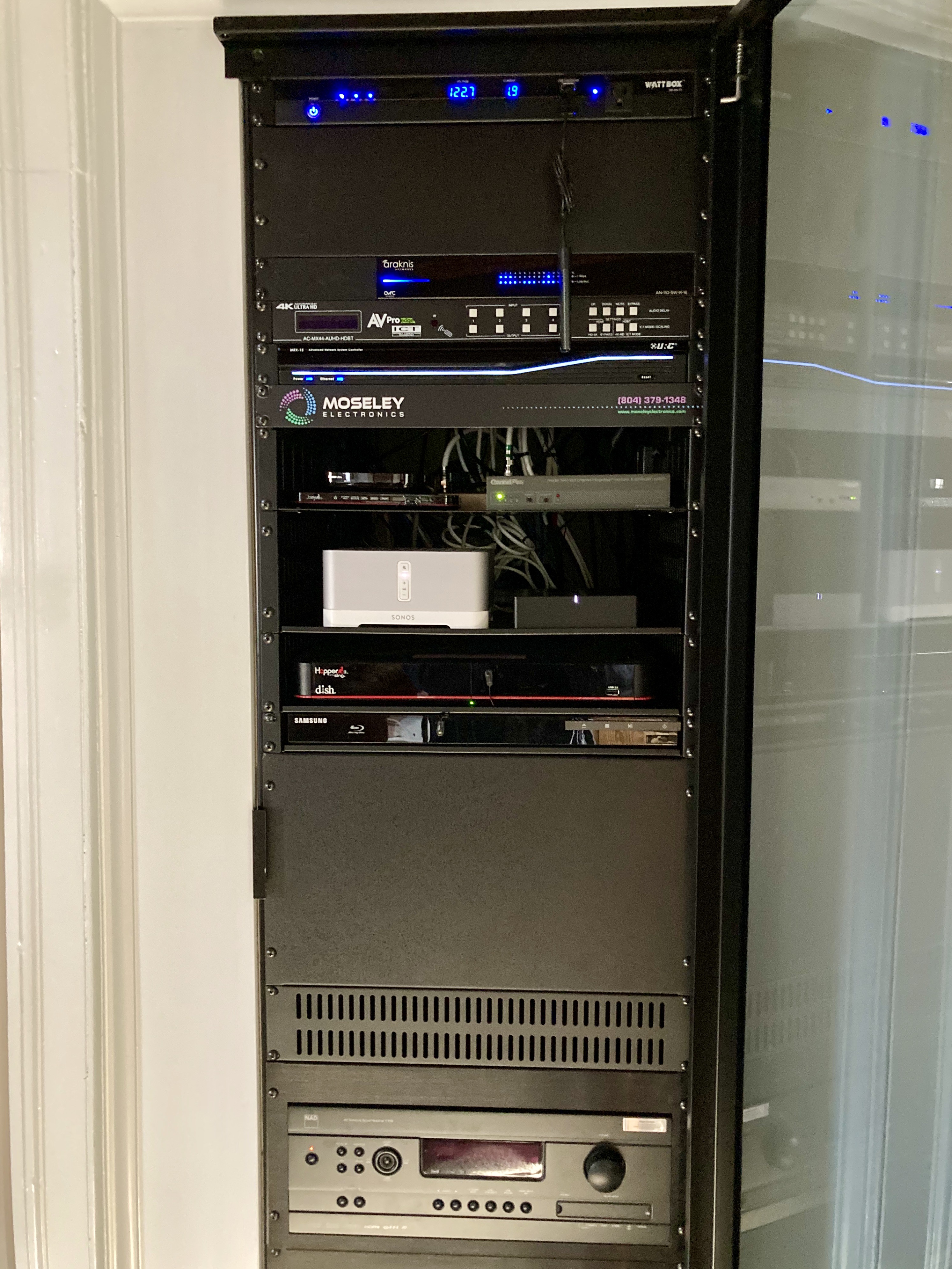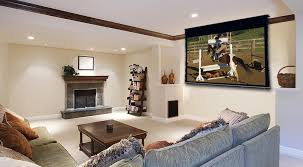Protecting Your Home Theater Equipment
It’s important to protect your investments and avoid damage to your electronics and your home. Professional installation helps avoid problems with your home theater system, and for ongoing satisfaction, you need to ensure it’s protected. Learn more about home theater protection and maximizing the life and performance of the components you’ve selected.
WHAT KIND OF PROTECTION DO YOU NEED?
Electronic components are easily damaged by heat, voltage spikes, and humidity. Any one of these in excess will shorten the life of your equipment.
HEAT
Heat affects how semiconductors function and can shorten their life significantly. Most home theater equipment isn’t rated for temperatures above 140° F. While that’s warmer than the hottest day in Richmond, it’s not hotter than the temperatures inside an unventilated cabinet full of electronics.
VOLTAGE SPIKES
Voltage spikes often result from a nearby lightning strike. The electrical surge can travel through wires or the ground and into your equipment. Given that Virginia gets more than its fair share of thunderstorms, there’s an above-average risk of lightning causing an electrical spike that wipes out your receiver or other devices.
HUMIDITY
Unlike the first two, the risk from humidity extremes is more complicated to explain. Low humidity means the air is dry, and in that state, it conducts static electricity better. That doesn’t often cause electrical problems, but it is possible.
High humidity, which Richmond residents deal with throughout the summer and early autumn months, is a bigger problem. The reason is that it accelerates corrosion and can promote mold growth. You shouldn’t suffer these problems in a well air-conditioned room, but an outdoor home theater is another matter altogether.

PROTECTING AGAINST HEAT
You can do several things to reduce the risk of overheating. Keep the equipment clean, avoid stacking units if possible, ensure they get good airflow, and don’t overwork them. Here’s a closer look at each.
Dust and pet hair can be a huge problem. They build-up on grilles and vents, which reduces airflow through the equipment. They can also settle on fan blades and cooling fins, which reduces their efficiency. Regular dusting and vacuuming do a lot to prevent this.
One way to avoid dust is by placing the equipment in a cabinet. However, if air can’t flow easily in, out, and around the units, it’s just going to get hotter and hotter. For this reason, any cabinet used for home theater equipment must be well ventilated. As with individual units, air inlets, outlets, and fan blades must be kept clean. Your best bet is to purchase equipment racks with cooling fans installed directly into them to prevent equipment overheating.
You should also note that stacking units can cause heat problems. Hot air rises, so if there’s not much space between each piece, the lower units heat the higher ones.
Lastly, resist the temptation to crank the volume up to 11. This increases the current draw, which in turn means more heating. Many home theater systems have a maximum setting to limit how loud they can go.
HOME THEATER SURGE PROTECTION
To protect against voltage spikes, use surge protectors on all the outlets supplying the equipment. These look a lot like power strips but include internal components that absorb sudden spikes in voltage caused by lightning strikes.
Surge protector performance is specified in terms of joules, with a larger number indicating higher protection. Inexpensive surge protectors provide 400 to 800 joules of protection but for your expensive home theater equipment, look for those offering 1,000 joules or more.
If the home should suffer a nearby lightning strike, replace surge protectors immediately as the internal protection is sacrificial and they won’t provide any further protection. Even if there aren’t any storms, surge protectors should be replaced every two years as the protection degrades over time.
Note that, as with power strips, surge protectors should never be daisy-chained. This can overload the wall outlet they draw their current from, which could overheat and cause a fire.
Once you’ve fitted surge protectors to your home theater equipment, you may want to consider one or more power conditioners. These smooth out the small dips and spikes that occur all the time in the main electrical supply.
PROTECTING AGAINST ABNORMAL HUMIDITY
For an indoor home theater system, air conditioning usually provides adequate protection. However, problems can arise if the home or theater space is shut up for a long time and the a/c is turned off. If this will be the case, consider setting up a dehumidifier to reduce moisture levels.
Very low humidity promotes static electricity discharges. The Richmond area seldom experiences dry enough conditions for this to be a problem, but adding a humidifier to the A/C or HVAC system will eliminate any risk.
For an outdoor home theater system, humidity protection means using components (cables, loudspeakers, TVs,) designed specifically for the purpose. Don’t overlook that humidity can refer to rain and fog as well as hot, sticky weather, and we have plenty of all those in Richmond!
Ensuring theater components are suitable for outdoor use isn’t always straightforward and installation locations must be taken into account. This is why it pays to have your system professionally installed.
DON’T SKIMP ON HOME THEATER PROTECTION
When you are planning a home theater system or working with a professional installation company, include equipment protection in your considerations. If you already have a system in place, it’s not too late to add protection.
The most important element is to guard against voltage spikes. In addition, remember to avoid overheating and humidity extremes. It’s easy to assume that our relatively benign Richmond climate won’t cause problems, but that’s not necessarily correct. Outdoor systems in particular do need special consideration.
If you’d like to learn more or are ready to request a quote, specialists at Moseley Electronics will be happy to help.
Learn More
Comments are closed.